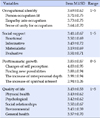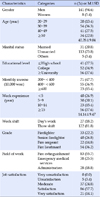Abstract
Purpose
The purpose of this study was to identify the relationships among occupational identity, social support, posttraumatic growth, and health-related quality of life regarding firefighters.
Methods
The study was conducted with 149 firefighters working at two fire stations in South Gyeongsang Province. Data were collected between August and September 2018. There were four research instruments in the structured survey, including the occupational identity scale, social support scale, Korea Posttraumatic Growth Inventory and World Health Organization Quality of Life Assessment Instrument.
Results
As a result, the quality of life of firefighters was positively correlated with social support, occupational identity, and posttraumatic growth. The factors associated with the quality of life of firefighters were social support (β=.36, p<.001), and occupational identity (β=.31, p<.001). The total explanatory power of these variables was 53.1%.
Figures and Tables
Table 2
Degrees of Occupational Identity, Social Support, Posttraumatic Growth and Quality of Life (N=149)

Table 3
Differences in Quality of Life by General and Work related Characteristics of Participants (N=149)

References
1. Lee YJ, Hyun SH, Cha JM, Song YS, Kim HS, Ahn YS. A study on the safety accident of firefighters. In : Proceedings of the Korea Institute of Fire Science and Engineering Conference; 2010. p. 126–132.
2. Lee MO. Quality of life and related to health factors of firefighters [master's thesis]. [Daegu]: Kyungpook National University;2013. 53.
3. Lehman AF. The well-being of chronic mental patients. Archives of General Psychiatry. 1983; 40(4):369–373. DOI: 10.1001/archpsyc.1983.01790040023003.

4. Bergner M. Quality of life, health status, and clinical research. Medical Care. 1989; 27(3):S148–S156. DOI: 10.1097/00005650-198903001-00012.

5. Choi ES. A model for post-traumatic stress and burnout in firefighters. The Korean Journal of Emergency Medical Services. 2001; 5(5):147–164.
6. Yoo HJ, Chung T, Kim W. The occupational identity and occupational prestige of Korean workers. Journal of Social Research. 2017; 18(1):77–103.
7. Holland JL, Daiger DC, Power PG. My vocational situation. Palo Alto, CA: Consulting Psychologists Press;1980. p. 1200.
8. Yoo HJ, Yoo TY, Chung TI, Bae S, Jo AR. Scale development of occupational identity and testing model of antecedents and outcome variables of occupational identity. Korean Journal of Industrial and Organizational Psychology. 2014; 27(4):617–642. DOI: 10.24230/ksiop.27.4.201411.617.

9. Lee K, Jung M. The effects of the professional identity and the peer support of firefighters on the quality of life: mediating active stress coping. The Journal of Humanities and Social Sciences 21. 2018; 9(3):383–398. DOI: 10.22143/HSS21.9.3.30.

10. Noh YC. A study on the causal model of fire officer's post-traumatic growth process: focusing on moderating effects of support resources and personal characteristics [dissertation]. [Gwangju]: Chosun University;2015. 136.
11. Cobb S. Presidential address-1976. Social support as a moderator of life stress. Psychosomatic Medicine. 1976; 38(5):300–314. DOI: 10.1097/00006842-197609000-00003.
12. Park JW. A study to development a scale of social support [dissertation]. [Seoul]: Yonsei University;1985. 150.
13. Cohen S, Wills TA. Stress, social support and the buffering hypothesis. Psychological Bulletin. 1985; 98(2):310–357. DOI: 10.1037/0033-2909.98.2.310.

14. Yoon MS, Kim SH. Mediating effects of depression and social support between the relationship job stress and quality of life among firefighters. Mental Health & Social Work. 2014; 42(2):5–34.
15. An CS. The effects of fire-fighting officers' PTSD on their physical and mental health: focusing on the moderating effect of social support. Korean Journal of Local Government & Administration Studies. 2016; 30(3):229–251. DOI: 10.18398/kjlgas.2016.30.3.229.
16. Choi SM, Kim YJ, Kwon JH. Effects of cognitive and behavioral coping and social supports on post traumatic growth: depending on PTSD symptom severity. Cognitive Behavior Therapy in Korea. 2013; 13(2):307–328.
17. Yu HJ. The mediating effects of social support and deliberate rumination in the influence of distress by trauma on posttraumatic growth. Journal of the Korean Data & Information Science Society. 2018; 29(4):997–1012. DOI: 10.7465/jkdi.2018.29.4.997.

18. Park KS, Ha Y, Seo M, Choi YS, Kim MJ, Jeong Y, et al. Impact of health-related quality of life in firefighters: focused on posttraumatic stress, health-related work limitations, and family support. Korean Journal of Occupational Health Nursing. 2017; 26(3):142–150. DOI: 10.5807/kjohn.2017.26.3.142.
19. Tedeschi RG, Calhoun LG. Posttraumatic growth: conceptual foundations and empirical evidence. Psychological Inquiry. 2004; 15(1):1–18. DOI: 10.1207/s15327965pli1501_01.

20. Kwak M, Bae J. Posttraumatic growth and related factors in firefighters. Journal of Korean Academy of Psychiatric and Mental Health Nursing. 2017; 26(2):124–133. DOI: 10.12934/jkpmhn.2017.26.2.124.

21. Yoo MR, Choi SY, Han HL, Seo YM, Noh MI. The effect of post-traumatic growth, resilience, and optimism on quality of life among the disaster victims. Journal of Military Nursing Research. 2015; 33(2):1–14.

22. Tedeschi RG, Calhoun LG. The Posttraumatic Growth Inventory: measuring the positive legacy of trauma. Journal of Traumatic Stress. 1996; 9(3):455–471. DOI: 10.1002/jts.2490090305.

23. Song SH, Lee HS, Park JH, Kim KH. Validity and reliability of the Korean version of the Posttraumatic Growth Inventory. The Korean Journal of Health Psychology. 2009; 14(1):193–214. DOI: 10.17315/kjhp.2009.14.1.012.

24. Min SK, Lee CI, Kim KI, Suh SY, Kim DK. Development of Korean version of WHO Quality of Life Scale abbreviated version (WHOQOL-BREF). Journal of the Korean Neuropsychiatric Association. 2000; 39(3):571–579.
25. Park EH, Kim HS. A study on the factors affecting on worker's quality of life. Journal of Digital Convergence. 2017; 15(11):581–589. DOI: 10.14400/JDC.2017.15.11.581.
26. Kim JE, Lee J. An empirical study of influencing factors affecting the morale of fire officers. Crisisonomy. 2019; 15(5):13–34.

27. Mead S, Hilton D, Curtis L. Peer support: a theoretical perspective. Psychiatric Rehabilitation Journal. 2001; 25(2):134–141. DOI: 10.1037/h0095032.

28. American Psychiatric Association.
JS Kwon
. Diagnostic and statistical manual of mental disorders (DSM-5). 5th ed. Washington, DC: American Psychiatry Lab;2013. p. 991.




 PDF
PDF ePub
ePub Citation
Citation Print
Print






 XML Download
XML Download